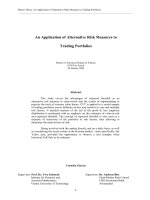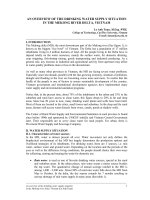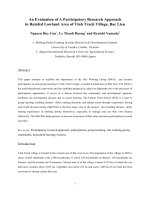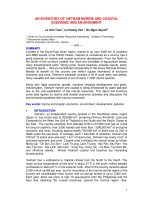Tải Write an email of 160 - 180 words to a friend from another country asking for information and advice - Writing Skills 2 Unit 7 lớp 11 Further Education| Viết thư bằng tiếng Anh theo chủ đề
Bạn đang xem bản rút gọn của tài liệu. Xem và tải ngay bản đầy đủ của tài liệu tại đây (90.74 KB, 8 trang )
<span class='text_page_counter'>(1)</span><div class='page_container' data-page=1>
<b>GIẢI TIẾNG ANH LỚP 11 MỚI THEO UNIT</b>
<b>WRITING SKILLS UNIT 7: FURTHER EDUCATION</b>
<b>WRITING bài 3. Choose two of the following points about studying abroad. Write an</b>
<b>email of 160 - 180 words to a friend from another country asking for information and</b>
<b>advice. Use the outline in 2. Chọn hai trong số các chủ đề dưới đây về du học. Viết</b>
<b>email dài 160-180 từ cho bạn nước ngoài hỏi thông tin và xin lời khuyên về du học. Sử</b>
<b>dụng dàn bài ờ bài tập 2.</b>
WRITING bài 3. Choose two of the following points about studying abroad. Write an email
of 160 - 180 words to a friend from another country asking for information and advice. Use
the outline in 2.
1. Work experience for career-based courses
2. Tuition fees at colleges and universities
3. Travelling in your host city and country
4. Experiencing culture shock when studying abroad
5. Working part-time
6. Opening a bank account
7. Surviving the cold and wet weather
8. Visas and other documents
<b>Tạm dịch:</b>
<b>Chọn hai trong số các chủ đề dưới đây về du học. Viết email dài 160 - 180 từ cho bạn</b>
<b>nước ngồi hỏi thơng tin và xin lời khun về du học. Sử dụng dàn bài ờ bài tập 2.</b>
1. Kinh nghiệm làm việc cho các khóa học hướng nghiệp
2. Học phí tại các trường cao đẳng và đại học
</div>
<span class='text_page_counter'>(2)</span><div class='page_container' data-page=2>
5. Làm việc bán thời gian
6. Mở tài khoản ngân hàng
7. Sinh tồn trong thời tiết lạnh và ẩm ướt
8. Thị thực và các tài liệu khác
<b>Viết email tiếng Anh cho bạn nước ngồi hỏi thơng tin và xin lời khuyên về du học </b>
<b>-Bài viết số 1</b>
Dear Maria,
I am writing to ask you for some information and advice on further education.
I am going to finish secondary school in May and I have been thinking a lot about taking a
gap year or pursuing further education immediately. Here are the points that worry me most.
First, I want to consult you about the advantages and disadvantages of taking a gap year. I
know that a lot of school leavers in your country prefer taking a gap year before deciding to
pursue further education. Would a gap year look good on my college application?
If I pursue further education immediately, what kind of attendance mode should I choose?
There are excellent universities in your country, and a bachelor’s degree from one of them
will definitely help me to find a good job easily. However, the tuition fees and living
expenses will be very high, and I am not sure if a scholarship will cover all the costs. Do
distance learning degrees offer the same content as campus-based degrees?
I am looking forward to hearing from you soon.
Regards,
An.
<b>Write an email to a friend from another country asking for information and advice </b>
<b>-bài viết số 2</b>
Dear Taylor,
</div>
<span class='text_page_counter'>(3)</span><div class='page_container' data-page=3>
continuing my further education in the UK. Therefore, I want to consult you on some
points:
First, as far as I know, the weather in your country is severe with lots of rain and snow so I
wonder whether a student in a tropical country like me can adapt to it. Also, what I worried
most is that I there are many things about the custom and culture of your country I have not
known so I would appreciate if you tell me some things I should do and shouldn’t do when
traveling to the UK in your next email.
In addition, I am keen on taking a part-time job at a small restaurant or grocery store after
school to earn some money. Can you recommend me some places?
I wish you and your family the best. I look forward to hearing from you soon.
Best regards,
Huong
<b>Hướng dẫn dịch</b>
Gửi Taylor,
Tớ viết thư này để hỏi cậu về một số thông tin và lời khuyên về giáo dục nâng cao ở đất
nước cậu. Tớ sẽ tốt nghiệp cấp 3 vào mùa hè này và tớ đang nghĩ về việc tiếp tục việc học
hành của mình ở nước Anh. Vì vậy, tớ muốn xin cậu một vài lời khuyên về các vấn đề sau:
Thứ nhất, như tớ được biết, thời tiết ở nước cậu rất khắc nghiệt với nhiều mưa và tuyết nên
tớ tự hỏi không biết một học sinh ở nước có khí hậu nhiệt đới như tớ liệu có thích ứng được
khơng. Hơn nữa, điều tớ lo nhất đó là có rất nhiều thứ về văn hóa và phong tục tập qn ở
nước cậu mà tớ khơng biết vì vậy tớ sẽ rất biết ơn nếu cậu có thể cho tớ biết một số điều nên
và không nên làm khi đến Anh.
Ngồi ra, tớ cũng muốn kiếm một cơng việc làm thêm ở quán ăn hoặc cửa hàng tiện lợi để
kiếm thêm tiền. Cậu có thể giới thiệu cho tớ một vài nơi được không?
Tớ chúc cậu và gia đình sẽ gặp được những điều tốt đẹp nhất. Mong sớm nhận được hồi âm
của cậu.
</div>
<span class='text_page_counter'>(4)</span><div class='page_container' data-page=4>
Hương
<b>Write an email to your friend about your education at university - Bài viết số 3</b>
Dear ...
I am writing to ask you for some information and advice on further education.
I am going to finish secondary school in May and I have been thinking a lot about taking a
gap year or pursuing further education immediately. Here are the points that worry me the
most.
First, I want to consult you about the advantages and disadvantages of taking a gap year. I
know that a lot of school leavers in your country prefer taking a gap year before deciding to
pursue further education. Would a gap year look good on my college application?
If I pursue further education immediately, what kind of attendance mode should I choose?
There are excellent universities in your country, and a bachelor's degree from one of them
will definitely help me to find a good job easily. However, the tuition fees and living
expenses will be very high, and I am not sure if a scholarship will cover all the costs. Do
distance learning degrees offer the same content as campus-based degrees?
I am looking forward to hearing from you soon.
Regards,
<b>Bài viết tiếng Anh về further education - Bài viết số 4</b>
Dear Susan,
I am preparing for going to America to study medicine. I don't think I will have many
problems with culture shock, but I should know well about it before I fly. Once I am in
America; of course, I will have to take the unfamiliar around me and may feel confused
sometimes.
</div>
<span class='text_page_counter'>(5)</span><div class='page_container' data-page=5>
reading through travel forums, guidebooks, news reports... but what I have read is so
general.
One more thing, Susan, what is the best way to get involved with the local community?
What are the cultural activities that often take place there? I will no longer feel culture
shock when I am used to living in their lifestyle, I think.
Finally, I wish you and your family the best. I look forward to hearing from you soon.
Regards,
Phương Anh
<b>Bài dịch</b>
Susan thân mến,
Tôi đang chuẩn bị sang Mỹ để học về dược. Tôi không nghĩ rằng tôi sẽ có nhiều vấn đề với
cú sốc văn hố, nhưng tơi nên biết rõ về nó trước khi đến. Khi tôi ở Mỹ; tất nhiên, tôi sẽ
phải làm quen với những điều khơng quen thuộc xung quanh tơi và có thể đôi khi cảm thấy
bối rối.
Lúc này tôi đang nghĩ đến bạn và viết thư để hỏi bạn về cách làm thế nào để đối phó với cú
sốc văn hóa. Hãy nói cho tơi biết chi tiết những gì tơi nên làm để hiểu một nền văn hoá
khác, làm sao tơi có thể có được sự cân bằng trong cuộc sống mới của tơi, và tơi nên học
những gì để thích nghi với nó. Tơi đã dành rất nhiều thời gian đọc qua các diễn đàn du lịch,
sách hướng dẫn, báo cáo tin tức ... nhưng những gì tơi đã đọc là quá chung chung.
Một điều nữa, Susan, cách tốt nhất để tham gia cộng đồng địa phương là gì? Các hoạt động
văn hố thường xảy ra ở đó là gì? Tơi nghĩ rằng tơi sẽ khơng cịn cảm thấy cú sốc văn hố
khi tơi quen với cuộc sống của họ.
Cuối cùng, tơi muốn chúc bạn và gia đình khỏe mạnh. Tôi mong sớm nhận được hồi âm từ
bạn. Trân trọng,
Phương Anh
</div>
<span class='text_page_counter'>(6)</span><div class='page_container' data-page=6>
Dear Hoa!
The first year of college is a new beginning, but it is also confusing and skeptical. To help
you have a better orientation, we have consulted "seniors" who have been in college and
they will partly give you useful advice from their own experiences.
Freshman year - a fresh start. First year college gives you the opportunity to reaffirm your
values, skeptical of prejudices and set the stage for both career and life to come. You might
say, "God, I'm only 18!". So, to help you have a good orientation, we have consulted the
"seniors" who have been in college and they will partly give you useful advice from their
own experiences.
Don't worry if you find the subjects too difficult to handle on your own, you can always
seek help in and out of the classroom. You can get help from professors who will be more
than happy to help you during office hours as long as you ask in a polite and courteous
manner. If that doesn't work, maybe you should try the live education sites on YouTube
-Asad Mirza, Florida International University.
Understand the system of the school you attend. Don't expect the student council to pay
special attention to you. Be ready to "fight" yourself to the end to get what you need, from
registering subjects, correcting grades, getting consent from teachers ... Besides, professors,
or teachers are Best and most useful "ally" if you know. how to link with them. They will
help you get through the mess and focus more on your main job of lecturing, studying and
researching. - Krista Cohen, Brooklyn College.
Best friend,
Hoai Anh
<b>Viết thư cho người bạn nước ngoài để hỏi về du học - bài viết số 6</b>
Dear Liam,
</div>
<span class='text_page_counter'>(7)</span><div class='page_container' data-page=7>
First, what is the procedure for applying for a student visa? Of course. I have to submit an
application but what other documents are required? How long does it take me to obtain my
student visa? It is important to plan time to wait for visa processing because the time
between finding out I have been accepted to go and leaving may be very close together.
Second, do 1 have to present my financial documents; for example proof of funds, to prove
that I am able to pay for my education? And last, do I need to obtain the International
Certificate of Vaccination? Is it required that I have certain vaccinations before I go? What
are they? After all. can you make me a checklist: what I should bring and what I should
leave at home?
I wish you and your family the best. I look forward to hearing from you soon.
Regards,
Ngoc Minh
<b>Lời dịch</b>
Liam thân mến,
Lần trước tơi đã nói với bạn rằng tôi đã suy nghĩ về việc tiếp tục học cao học ở Anh. Tôi đã
ứng tuyển vào một trường đại học ở London trước đây. Bây giờ tơi có một số câu hỏi cho
bạn.
Thứ nhất, thủ tục xin visa du học là gì? Tất nhiên. Tơi phải nộp đơn nhưng phải nộp những
giấy tờ gì? Tơi phải xin visa du học trong bao lâu? Điều quan trọng là lập kế hoạch thời gian
để chờ visa vì thời gian giữa việc nhận visa và thời gian đi có thể rất gần nhau. Thứ hai, Tơi
phải làm gì để chứng minh tài chính; ví dụ quỹ tín dụng, để chứng minh rằng tơi có thể trả
tiền cho việc học của tơi? Và cuối cùng, tơi có cần phải có Giấy chứng nhận tiêm chủng
quốc tế khơng? Phải chăng tơi đã phịng ngừa bệnh nhất định trước khi tôi đi? Chúng là gì?
Cuối cùng, bạn có thể làm cho tơi một danh sách : những gì tơi nên mang theo và những gì
tơi nên để lại ở nhà?
Tơi chúc bạn và gia đình của bạn sức khỏe. Tơi mong sớm nhận được hồi âm từ bạn.
Trân trọng,
</div>
<span class='text_page_counter'>(8)</span><div class='page_container' data-page=8>
Mời bạn đọc tham khảo thêm tài liệu Tiếng Anh lớp 11 tại đây:
Bài tập Tiếng Anh lớp 11 theo từng Unit:
</div>
<!--links-->









